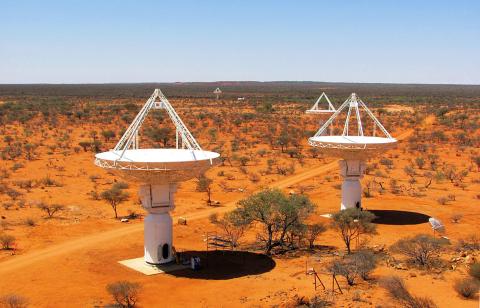Australia and South Africa will share hosting of a giant radio telescope made up of thousands of separate dishes and intended to help scientists figure out the make-up of the universe, the international consortium overseeing the project announced.
South Africa led an African consortium that included Botswana, Ghana, Kenya, Madagascar, Mauritius, Mozambique, Namibia and Zambia, and telescopes will be erected in all its partners. In South Africa, dishes will be added to a remote site in the arid Karoo, where a smaller radio telescope project already is underway.
South Africa and Australia, which partnered with New Zealand in bidding for the project, had competed fiercely. South Africa claimed victory on Friday, saying it got two of the projects three major components.

Photo: EPA
“We may feel slightly disappointed that we didn’t get the whole thing. But I think one should emphasize that we did get most of it,” said Justin Jonas, chief South African scientist on the project. “Two-thirds of the biggest instrument in the world is still the biggest instrument in the world,” he added.
South African Minister of Science and Technology Naledi Pandor and scientists who had prepared the country’s bid celebrated with an Africa-shaped cake at a news conference in Pretoria.
“This marks a real turning point in Africa, where we are becoming a destination for science and engineering, and not just a place where there are resources and tourism opportunities,” Jonas added.
Australia also welcomed the split decision.
“It is an outstanding result for the Australia-New Zealand bid after many years of preparation and an intensive international process,” Australian Minister for Science and Research Senator Chris Evans said.
The Square Kilometer Array telescope will be 50 times more sensitive and scan the sky 10,000 times faster than any existing telescope. It requires huge open spaces with very few humans.
John Womersley, chair of the consortium’s board, said the telescope will help scientists answer key questions: “Where do we come from? Where are we going? What is this universe we live in?”
“We don’t understand what 96 percent of our universe is made of,” he said.
The organization said dividing construction of the telescope will “maximize on investments already made by both Australia and South Africa.”
Womersley said that splitting construction between the two nations will likely add around 10 percent to the 350 million euro (US$439 million) cost of the first phase of building the giant telescope. However, he said there would be a payoff for astronomers.
“It delivers more science in phase one. The capabilities of this instrument are greater than the original design,” Womersley said.

Thousands gathered across New Zealand yesterday to celebrate the signing of the country’s founding document and some called for an end to government policies that critics say erode the rights promised to the indigenous Maori population. As the sun rose on the dawn service at Waitangi where the Treaty of Waitangi was first signed between the British Crown and Maori chiefs in 1840, some community leaders called on the government to honor promises made 185 years ago. The call was repeated at peaceful rallies that drew several hundred people later in the day. “This government is attacking tangata whenua [indigenous people] on all

RIGHTS FEARS: A protester said Beijing would use the embassy to catch and send Hong Kongers to China, while a lawmaker said Chinese agents had threatened Britons Hundreds of demonstrators on Saturday protested at a site earmarked for Beijing’s controversial new embassy in London over human rights and security concerns. The new embassy — if approved by the British government — would be the “biggest Chinese embassy in Europe,” one lawmaker said earlier. Protester Iona Boswell, a 40-year-old social worker, said there was “no need for a mega embassy here” and that she believed it would be used to facilitate the “harassment of dissidents.” China has for several years been trying to relocate its embassy, currently in the British capital’s upmarket Marylebone district, to the sprawling historic site in the

The administration of US President Donald Trump has appointed to serve as the top public diplomacy official a former speech writer for Trump with a history of doubts over US foreign policy toward Taiwan and inflammatory comments on women and minorities, at one point saying that "competent white men must be in charge." Darren Beattie has been named the acting undersecretary for public diplomacy and public affairs, a senior US Department of State official said, a role that determines the tone of the US' public messaging in the world. Beattie requires US Senate confirmation to serve on a permanent basis. "Thanks to

‘IMPOSSIBLE’: The authors of the study, which was published in an environment journal, said that the findings appeared grim, but that honesty is necessary for change Holding long-term global warming to 2°C — the fallback target of the Paris climate accord — is now “impossible,” according to a new analysis published by leading scientists. Led by renowned climatologist James Hansen, the paper appears in the journal Environment: Science and Policy for Sustainable Development and concludes that Earth’s climate is more sensitive to rising greenhouse gas emissions than previously thought. Compounding the crisis, Hansen and colleagues argued, is a recent decline in sunlight-blocking aerosol pollution from the shipping industry, which had been mitigating some of the warming. An ambitious climate change scenario outlined by the UN’s climate